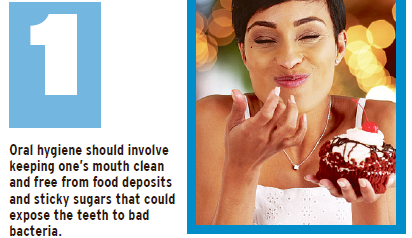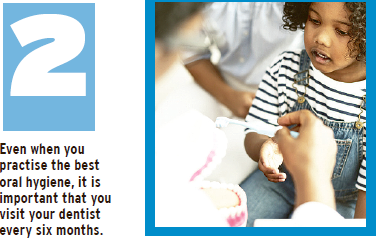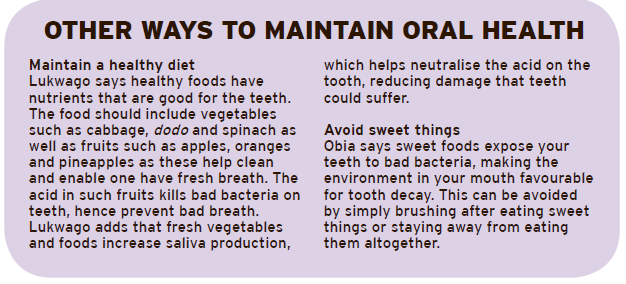Wellness: How to maintain good oral health
It is not good to go to bed after dinner without brushing because bacteria that feed on the food remains on the teeth lead to tooth decay.
By Stella Naigino
Robert Kintu's story
I used to brush my teeth every day and did not expect to have any problem. However, I would see people cringing whenever I moved closer to tell them something.
One time I was talking to a woman at my workplace and she asked me whether I have ever used a mouth wash. I said ‘no', but I did not find out why she had asked me.
A few months down the road, that same woman told me that our colleagues were complaining that I had bad breath. She encouraged me to read about the issue.
From my Internet search, I came to the conclusion that my bad breath was because I did not brush my tongue, but also due to the fact that I did not floss.
From that time, I started brushing my tongue every morning and evening and I floss regularly.

Oral hygiene
Oral hygiene is the practice of keeping one's mouth clean, preventing bad breath and other diseases that come with dirty teeth or not taking care of one's mouth, Dr James Obia, a dental surgeon at Mulago Hospital, says.
He says dental and oral hygiene is important for overall health and wellbeing of a person.
Dr Esther Lukwago, a dental surgeon at Kays Dental in Kampala, says oral hygiene should involve keeping one's mouth clean as well as free from food deposits and sticky sugars that could expose the teeth to bad bacteria.
Proper oral hygiene is achieved by practising effective brushing at home and at times professional cleaning by a dentist, Lukwago says.

Things one should do to ensure effective oral hygiene include:
Effective mouth cleaning
Lukwago says ideally, one should brush after every meal. However, since that may not be possible, effective teeth and mouth cleaning should be done twice a day — in the morning and after dinner.
"One should use clean and safe water and toothpaste that contains fluoride," she says, adding that it helps to prevent tooth decay.
Lukwago warns that it is not good to go to bed after dinner without brushing because bacteria that feed on the food remains on the teeth lead to tooth decay.

Visit your dentist
"Even when you practise the best oral hygiene, it is important that you visit your dentist every six months for your teeth to be professionally checked and advised accordingly," Lukwago says.
"This helps you to have any defaults in your teeth detected early and have them fixed before they get to advanced stages where they are hard to manage," she adds.
Lukwago says when one ignores signs of tooth decay, it can result in damage to the enamel, leading to cavities, which are painful and expensive to treat.
Avoid bad oral habits
Obia notes that bad oral habits such as smoking, opening bottles with teeth, drinking very cold and hot fluids,
coupled with chewing leaves (mira) are dangerous for one's teeth.
"Smoking can make tartar grow on teeth, yet removing it is not easy. Tartar also weakens teeth. Chewing mira can cause gum disease and also change the colour of one's teeth, which would cost you heavily to clean the teeth.
"Opening bottles with teeth damages teeth and can even cause cracks and break them. Drinking cold or hot fluids affects the sensitivity of the teeth," he explains.
Teeth decoration harmful
Obia says teeth decoration is done by putting jewels or opening gaps between teeth, among others. He says these weakens one's enamel, putting one's oral health at stake.
"Teeth decoration disrupts proper teeth cleaning as sometimes food spills that remain on teeth could hide under the jewel and if not cleaned well, the food stays on the teeth, causing dental caries," Obia explains.
Use the right toothbrush
Obia says toothbrushes with soft bristles are recommended for brushing and mouth-cleaning as those with rough bristles could damage the gum, exposing it to bacteria that can cause gum disease.
He says when the bristles begin to bend, it is highly recommended that you change the toothbrush. Bent bristles won't help achieve the importance of brushing one's teeth.
"It is important that after brushing you keep the toothbrush in a clean and aerated place, free from insects and vermin," Obia advises.
Lukwago warns against sharing toothbrushes, saying it is one way of spreading oral diseases.
"Stick to your own toothbrush and do not share it even with your spouse," she says.

How to brush
Brushing one's teeth right every morning and after dinner ensure good oral hygiene
Obia explains that before applying toothpaste on the toothbrush, rub the soft bristle toothbrush around the gum and teeth in circular motions.
After, vibrate the toothbrush bristles in the space between the gum and teeth, chewing surfaces and then rinse your mouth with clean water. After this, apply toothpaste to the brush and repeat the same procedure.
When you are done, wait for 3-5 minutes before expectorating the foam. Wait for about five minutes to rinse so that the toothpaste can be effective in killing germs.
When you take fizzy or sweet drinks and snacks during the day, consider using dental floss where the toothbrush cannot reach because there could be a possibility that sugars from fizzy drinks could have remained, giving bacteria a chance to feast on the sugars and cause damage your teeth.
Brush the tongue
Experts say since the tongue is inside the mouth, it means it is always warm and wet, making it easy for bad bacteria there to thrive if the tongue is not cleaned well.
Obia says foods that builds up on the tongue should be brushed off to avoid bad mouth odour and to prevent conditions such as halitosis that occur due to built-up bacteria on the tongue.